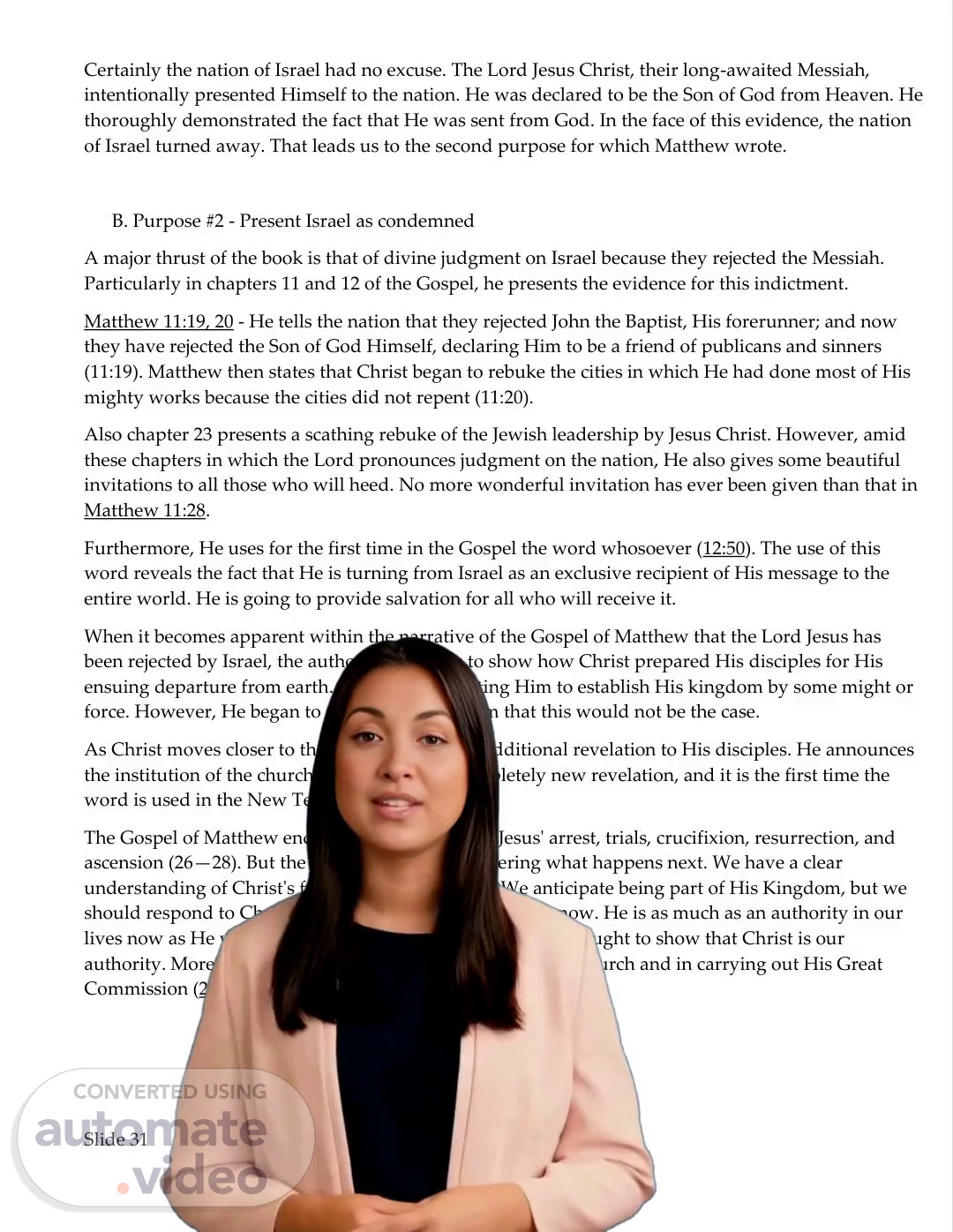Scene 1 (0s)
[Virtual Presenter] The nation of Israel had certainly no excuse for rejecting Jesus, as He intentionally presented Himself to them, being declared the Son of God from Heaven, and thoroughly demonstrating the fact that He was sent from God. Despite this overwhelming evidence, the nation of Israel turned away. This rejection led to the second purpose of Matthew's writing..
Scene 2 (21s)
[Audio] The Advent of the Messiah marks the beginning of Jesus' life, as He sets forth to fulfill the prophecies of old. The genealogy of Joseph, tracing back to King David, demonstrates Jesus' rightful claim to the throne of Israel. The birth narrative unfolds, revealing the miraculous conception of Jesus, born of a virgin, fulfilling the promise of Isaiah 9:6. The Wise Men, representing the Gentile nations, arrive bearing gifts, acknowledging Jesus as the King of Kings. Finally, we witness the flight to Egypt and return, as Jesus' family flees from the wrath of Herod, foreshadowing the greater exodus..
Scene 3 (1m 1s)
[Audio] Jesus was baptized by John the Baptist to fulfill all righteousness. As a sinless being, Jesus did not need to repent or confess sins, but He submitted to John's baptism to demonstrate His obedience to God's will..
Scene 4 (1m 16s)
[Audio] Jesus saw the opposition to His message and started teaching in parables when talking about His Kingdom. He did this to stop people from twisting His words and using them against Him..
Scene 5 (1m 26s)
[Audio] The sacrifice of the Messiah is a crucial part of the story of redemption. Jesus predicts His own betrayal, arrest, and trial in chapters 24 to 27. The fulfillment of Isaiah's prophecy about the suffering Messiah is seen, and ultimately, the crucifixion of Jesus occurs. This event marks the climax of the gospel, as it is the moment when Jesus takes upon Himself the sins of humanity, bearing the punishment that we deserve..
Scene 6 (1m 53s)
[Audio] Being poor in spirit means recognizing one's own spiritual bankruptcy and desperation for God's help. It is not about self-hatred or false humility, but rather acknowledging one's sinful condition and need for redemption..
Scene 7 (2m 7s)
[Audio] The Christian is not blessed for persecution caused by stupidity or abrasiveness, but rather for persecution because of righteousness. Like meekness, purity, and mercy, which are characteristics of every Christian, persecution is also a mark of being a follower of Christ. Therefore, if we choose to follow Christ, we should anticipate being persecuted..
Scene 8 (2m 28s)
[Audio] Jesus taught about the law and love by contrasting his teachings with those of the Pharisees. He emphasized the importance of considering our thoughts and motives behind our actions, rather than just focusing on the external act itself. This is seen in his teachings on murder, adultery, divorce, oaths, and loving our neighbors and enemies. Jesus showed that love is not limited to just our friends and family, but should extend to all people, including those we may not naturally get along with..
Scene 9 (2m 57s)
[Audio] Jesus teaches that when performing acts of public devotion such as almgiving, prayer, and fasting, we must check our motives. He warns against doing these things solely for human recognition or praise. Instead, we should focus on pleasing God alone, and not seek to impress others..
Scene 10 (3m 15s)
[Audio] Jesus teaches that true spirituality involves having a right attitude towards wealth, warning against the dangers of covetousness and materialism. He emphasizes that God is aware of our needs and will provide for us, encouraging us to have faith and trust in Him. Jesus also highlights the importance of choosing to serve God above all else, illustrating this concept through the parable of the two masters..
Scene 11 (3m 41s)
[Audio] Jesus compares a speck of sawdust in your brother's eye with a great beam in your own eye, pointing out that it is easier to identify and criticize the small sins of others rather than acknowledging and addressing our own greater flaws. This tendency is often compounded by the fact that we are most offended by the same character flaws in others that we ourselves possess. For instance, a person with a temper may be deeply offended if someone else gets angry with them. Before identifying others as pigs or dogs who reject the truth, Jesus emphasizes the need for some measure of judging. However, He also teaches that if someone rejects the truth, we should not continue to preach to them, but instead "wipe the dust from our shoes" and move on..
Scene 12 (4m 26s)
[Audio] Many people are deceived by fake miracles because they are more interested in the spectacular than the spiritual. Since miracles can be easily manipulated or faked, God says "I never knew you" to those who rely solely on them. Only the righteous will live by faith. We must be cautious, as some claim to have a direct connection with God, but their actions may be part of a cult. Simply using the name of Christ and the Bible does not guarantee a system's authenticity..
Scene 13 (4m 52s)
[Audio] Jesus, the Suffering Servant, was written by John Mark, who was a minister and a companion of Paul and Barnabas. Mark's Gospel emphasizes Christ's suffering and death, portraying Him as the Suffering Servant..
Scene 14 (5m 6s)
[Audio] Christ suffered and served, and this is demonstrated throughout Mark's Gospel. During His temptation in the wilderness, Jesus faced wild beasts and emerged victorious, overcoming even Satan himself. The presence of ministering angels who assisted Him would have provided additional comfort to the Romans, illustrating God's care and provision amidst adversity. Furthermore, Jesus was rejected by His own family, who believed He had lost His mind and accused Him accordingly..
